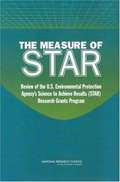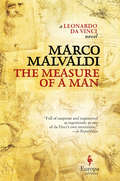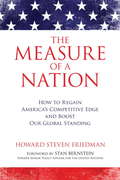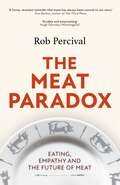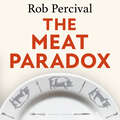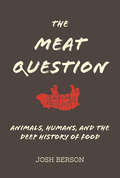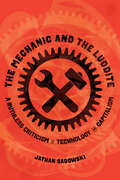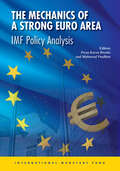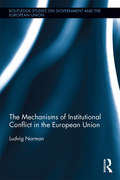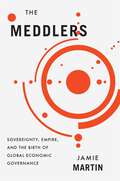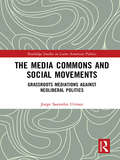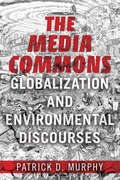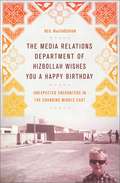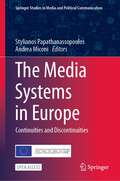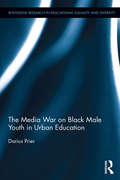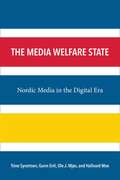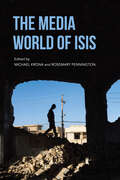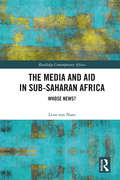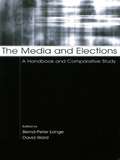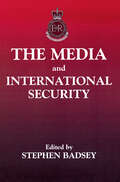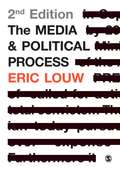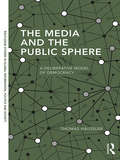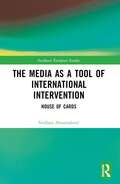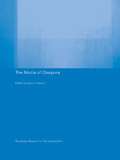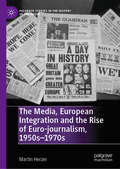- Table View
- List View
The Measure of STAR: Review of the U.S. Environmental Protection Agency's Science To Achieve Results (STAR) Research Grants Program
by Committee to Review EPA's Research Grants ProgramThe report favorably reviews the U. S. Environmental Protection Agency's competitive research grants program, finding that it has yielded significant new findings and knowledge critical for EPA's decision-making process. Established in 1995, the grants program was designed to enable the nation's best scientists and engineers to explore new ways to safeguard the environment and protect public health. The program awards about $100 million a year in grants and fellowships to independent investigators, multidisciplinary teams, and graduate students at universities and nonprofit institutions.
The Measure of a Man: A Leonardo da Vinci Novel
by Marco MalvaldiThe acclaimed Italian author spins a tale of Renaissance innovation, intrigue and murder in this historical novel about Leonardo da Vinci.October 1493. Florence is still mourning the death of Lorenzo the Magnificent. Columbus&’ ships have only recently reached the New World, and Milan is experiencing a renaissance under the leadership of Ludovico il Moro. Not far from Milan&’s Castle, a peculiar man named Leonardo da Vinci lives above his workshop. Da Vinci doesn&’t eat meat, writes from right to left, and struggles to get paid by his employers. Yet his fame extends beyond the Alps, to the French court of Charles VIII. Charles has sent envoys on a mission to uncover the Italian inventor&’s rumored secret plans for an invincible mechanical knight. Meanwhile, after a man is found dead in the Castle&’s courtyard, il Moro turns to Da Vinci for help. Five hundred years after Leonardo&’s death, Marco Malvaldi combines literature, science, history, and mystery to bring back to life one of the greatest figures of the Renaissance.
The Measure of a Nation
by Howard Steven FriedmanIf America were a corporation, how would an independent analyst judge its ability to compete against other corporate giants? According to the author, that hypothetical analyst would label America a corporate dinosaur and recommend that the nation either change or face extinction. This book focuses on how to improve America by first comparing its performance with thirteen competitive industrial nations, then identifying the best practices found throughout the world that can be adopted here in the United States. The author lays out some disturbing facts about America's lack of competitiveness in five key areas: health, education, safety, equality, and even democracy. Taking the approach that "data doesn't lie," the author notes alarming statistics, for example:-Americans have the lowest life expectancy among all competitor nations.-Americans are at least two times more likely to be murdered and four times more likely to be incarcerated than any other competitor country, including Japan, France, and the United Kingdom.-America shows the sharpest disparity between rich and poor among all nations on its competitor list. Using charts that clearly illustrate the unbiased, party-neutral data, the author uncovers the major problem areas that the nation must address to become a leader again. Homing in on best practices from other countries than can be adapted to the United States, the author plots a course to transform America from a corporate behemoth burdened by internal issues and poor performance to a thriving business with an exciting portfolio of solutions.
The Meat Paradox: ‘Brilliantly provocative, original, electrifying’ Bee Wilson, Financial Times
by Rob PercivalOur future diet will be shaped by diverse forces. It will be shaped by novel technologies and the logic of globalisation, by geopolitical tensions and the evolution of cultural preferences, by shocks to the status quo - pandemics and economic strife, the escalation of the climate and ecological crises - and by how we choose to respond. It will also be shaped by our emotions. It will be shaped by the meat paradox.'Should we eat animals?' was, until recently, a question reserved for moral philosophers and an ethically minded minority, but it is now posed on restaurant menus and supermarket shelves, on social media and morning television. The recent surge in popularity for veganism in the UK, Europe and North America has created a rupture in the rites and rituals of meat, challenging the cultural narratives that sustain our omnivory.In The Meat Paradox, Rob Percival, an expert in the politics of meat, searches for the evolutionary origins of the meat paradox, asking when our relationship with meat first became emotionally and ethically complicated. Every society must eat, and meat provides an important source of nutrients. But every society is moved by its empathy. We must all find a way of balancing competing and contradictory imperatives. It is essential reading for anyone interested in the origins of our empathy, the psychology of our dietary choices, and anyone who has wondered whether they should or shouldn't eat meat.
The Meat Paradox: ‘Brilliantly provocative, original, electrifying’ Bee Wilson, Financial Times
by Rob PercivalOur future diet will be shaped by diverse forces. It will be shaped by novel technologies and the logic of globalisation, by geopolitical tensions and the evolution of cultural preferences, by shocks to the status quo - pandemics and economic strife, the escalation of the climate and ecological crises - and by how we choose to respond. It will also be shaped by our emotions. It will be shaped by the meat paradox.'Should we eat animals?' was, until recently, a question reserved for moral philosophers and an ethically minded minority, but it is now posed on restaurant menus and supermarket shelves, on social media and morning television. The recent surge in popularity for veganism in the UK, Europe and North America has created a rupture in the rites and rituals of meat, challenging the cultural narratives that sustain our omnivory.In The Meat Paradox, Rob Percival, an expert in the politics of meat, searches for the evolutionary origins of the meat paradox, asking when our relationship with meat first became emotionally and ethically complicated. Every society must eat, and meat provides an important source of nutrients. But every society is moved by its empathy. We must all find a way of balancing competing and contradictory imperatives. It is essential reading for anyone interested in the origins of our empathy, the psychology of our dietary choices, and anyone who has wondered whether they should or shouldn't eat meat.
The Meat Question: Animals, Humans, and the Deep History of Food (The\mit Press Ser.)
by Josh BersonA provocative argument that eating meat is not what made humans human and that the future is not necessarily carnivorous.Humans are eating more meat than ever. Despite ubiquitous Sweetgreen franchises and the example set by celebrity vegans, demand for meat is projected to grow at twice the rate of demand for plant-based foods over the next thirty years. Between 1960 and 2010, per capita meat consumption in the developing world more than doubled; in China, meat consumption grew ninefold. It has even been claimed that meat made us human—that our disproportionately large human brains evolved because our early human ancestors ate meat. In The Meat Question, Josh Berson argues that not only did meat not make us human, but the contemporary increase in demand for meat is driven as much by economic insecurity as by affluence. Considering the full sweep of meat's history, Berson concludes provocatively that the future is not necessarily carnivorous.Berson, an anthropologist and historian, argues that we have the relationship between biology and capitalism backward. We may associate meat-eating with wealth, but in fact, meat-eating is a sign of poverty; cheap meat—hunger killing, easy to prepare, eaten on the go—enables a capitalism defined by inequality. To answer the meat question, says Berson, we need to think about meat-eating in a way that goes beyond Paleo diets and PETA protests to address the deeply entwined economic and political lives of humans and animals past, present, and future.
The Mechanic and the Luddite: A Ruthless Criticism of Technology and Capitalism
by Dr. Jathan SadowskiThis short book demystifies how the two systems of technology and capitalism work together and equips readers with practical tools to dismantle them and build a better world, bit by bit. Our society is constantly made to serve the needs of two systems: technology and capitalism. Neither exists outside humans, but both are treated as above and beyond us. The Mechanic and the Luddite offers the critical tools needed to deconstruct these systems—how they work, whom they work for, and what work they do in our lives. With signature style and energy, Jathan Sadowski presents a provocative one-stop shop for understanding the political economy of technology and capitalism. Each chapter breaks down key features of technological capitalism, offering sharp, synthetic, and authoritative analysis of topics like innovation, labor, data, and risk. It's not enough to know how the machinery of capitalism is put together and how its parts operate; we must also know whom the machines serve and when they should be taken apart, to be rebuilt for new purposes or destroyed for good. The Mechanic and the Luddite provides the political guidance needed to make these crucial decisions.
The Mechanics of a Strong Euro Area: Imf Policy Analysis
by Koeva Petya, Mahmood PradhanA report from the International Monetary Fund.
The Mechanisms of Institutional Conflict in the European Union (Routledge Studies on Government and the European Union)
by Ludvig NormanHow institutional conflicts arise in international political orders and the conditions shaping the outcomes of such conflicts has become the object of considerable contemporary focus. This book considers the dynamics of institutional conflict and institutional change in international organizations, specifically focusing on the European Union, the most highly integrated international political order on the globe. In a world where political decision making increasingly takes place above the nation state level, it theorises the social mechanisms that lead to the point at which these tensions become explicit and the customary functioning of international political orders tips into outright conflict between different organizational entities. Taking a constructivist approach, it examines two in-depth case studies - in the field of Justice and Home Affairs (JHA) and the EU’s Common Foreign and Security Policy (CFSP) - to explain the dynamics of the processes that lead up to institutional conflicts and provide some explanation for their final outcomes. This text will be of key interest to fields of and European Integration, EU Politics and more broadly International Relations.
The Meddlers: Sovereignty, Empire, and the Birth of Global Economic Governance
by Jamie MartinA pioneering history traces the origins of global economic governance—and the political conflicts it generates—to the aftermath of World War I. International economic institutions like the IMF and World Bank exert incredible influence over the domestic policies of many states. These institutions date from the end of World War II and amassed power during the neoliberal era of the late twentieth century. But as Jamie Martin shows, if we want to understand their deeper origins and the ideas and dynamics that shaped their controversial powers, we must turn back to the explosive political struggles that attended the birth of global economic governance in the early twentieth century. The Meddlers tells the story of the first international institutions to govern the world economy, including the League of Nations and Bank for International Settlements, created after World War I. These institutions endowed civil servants, bankers, and colonial authorities from Europe and the United States with extraordinary powers: to enforce austerity, coordinate the policies of independent central banks, oversee development programs, and regulate commodity prices. In a highly unequal world, they faced a new political challenge: was it possible to reach into sovereign states and empires to intervene in domestic economic policies without generating a backlash? Martin follows the intense political conflicts provoked by the earliest international efforts to govern capitalism—from Weimar Germany to the Balkans, Nationalist China to colonial Malaya, and the Chilean desert to Wall Street. The Meddlers shows how the fraught problems of sovereignty and democracy posed by institutions like the IMF are not unique to late twentieth-century globalization, but instead first emerged during an earlier period of imperial competition, world war, and economic crisis.
The Media Commons and Social Movements: Grassroots Mediations Against Neoliberal Politics (Routledge Studies in Latin American Politics)
by Jorge Saavedra UtmanWhat does it mean to have a voice in a formal democracy operating under neoliberal guidelines and with an almost entirely private media system? How can the people gain their voice and engage in a dialogue with hegemonic actors and discourses? In this book, Jorge Saavedra Utman examines the role of media and communicative practices during one of the largest social mobilizations in Latin America in the last 30 years: Chile’s 2011 students’ movement. Saavedra Utman observes the eye-catching, subversive, but also intimate practices that, in a country with a liberal democracy and neoliberal policies, allowed people to speak up and become political actors from grassroots positions. Presenting rich qualitative data that is sourced from interviews and focus groups with activists, he introduces a fresh perspective on the study of media and communications and social movements. Saavedra Utman paints a clearer picture of contentious events since 2011 - like the Arab Spring and Occupy – to understand the relevance of media and communications in contemporary quests for participation and democracy. Promising to be an important book, The Media Commons and Social Movements represents a significant contribution to our understanding of communicative dimensions of protest and social change.
The Media Commons: Globalization and Environmental Discourses
by Patrick D MurphyToday's global media sustains a potent new environmental consciousness. Paradoxically, it also serves as a far-reaching platform that promotes the unsustainable consumption ravaging our planet. Patrick Murphy musters theory, fieldwork, and empirical research to map how the media communicates today's many distinct, competing, and even antagonistic environmental discourses. The media draws the cultural boundaries of our environmental imagination--and influences just who benefits. Murphy's analysis emphasizes social context, institutional alignments, and commercial media's ways of rendering discussion. He identifies and examines key terms, phrases, and metaphors as well as the ways consumers are presented with ideas like agency and the place of nature. What emerges is the link between pervasive messaging and an "environment" conjured by our media-saturated social imagination. As the author shows, today's complex, integrated media networks shape, frame, and deliver many of our underlying ideas about the environment. Increasingly--and ominously--individuals and communities experience these ideas not only in the developed world but in the increasingly consumption-oriented Global South.
The Media Relations Department of Hizbollah Wishes You a Happy Birthday: Unexpected Encounters in the Changing Middle East
by Neil MacfarquharWith his counterintuitive sense since his boyhood in Qadhafi's Libya that the Middle East, despite all the bloodshed in its recent history, is a place of warmth, humanity, and generous eccentricity, Neil MacFarquhar introduces a cross-section of unsung, dynamic men and women pioneering political and social change. The author interacts with Arabs and Iranians in their every day lives, removed from the violence we see constantly, yet wrestling with the region's future.
The Media Systems in Europe: Continuities and Discontinuities (Springer Studies in Media and Political Communication)
by Stylianos Papathanassopoulos Andrea MiconiThis open access book traces the evolution of the European media landscape in the last 30 years, from 1990 to 2020. It is based on the theoretical classical hypotheses of regional media systems provided by Hallin and Mancini and at the same time puts them to test. The book further defines the proportions between geocultural patterns – national, regional, European, and global – to outline evolutionary trends in media landscapes. It analyzes to which degree European media have become more European, in the historical course of administrative unification and breaks the results down into concrete indexes and indicators. The book discusses the media systems of the member states of the European Union through a regional perspective, identifying similarities, differences, as well as their convergence in the digital age. It sheds light on the evolution of media systems in Europe, introduces existing relevant theoretical perspectives, and offers an overview of the new developments in European media.The book will appeal to students, researchers, and scholars of political science, communication, media, cultural, and policy studies, as well as practitioners and professionals interested in a better understanding of the European media landscape's evolution.
The Media War on Black Male Youth in Urban Education (Routledge Research in Educational Equality and Diversity)
by Darius PrierNews media, film, and the music industry have become powerful sources of misrepresentation of Black male life in the social imagination of white society. The pedagogy of popular culture has important implications for educators and youth advocates who desire to challenge the myths and distortions that ultimately harm youth. This volume raises awareness of the media war on Black male youth in popular culture, and the impact this image battle has on the discriminatory treatment of the population in urban educational settings. Citing the recent controversial deaths of Trayvon Martin and Jordan Davis, the portrayal of black males in contemporary films, and the locus of hip-hop masculinities, this volume offers a unique framework for analyzing how contemporary image-making practices affect Black male youth in urban education. It also offers ethical considerations for educators in their critique, consumption and reading of Black male subjectivity in media, and provides avenues for practical applications of critical media literacy on the ground.
The Media Welfare State: Nordic Media In The Digital Era
by Ole J. Mjøs Hallvard Moe Trine Syvertsen Gunn Sara EnliThe Media Welfare State: Nordic Media in the Digital Era comprehensively addresses the central dynamics of the digitalization of the media industry in the Nordic countries--Sweden, Norway, Denmark, Finland, and Iceland--and the ways media organizations there are transforming to address the new digital environment. Taking a comparative approach, the authors provide an overview of media institutions, content, use, and policy throughout the region, focusing on the impact of information and communication technology/internet and digitalization on the Nordic media sector. Illustrating the shifting media landscape the authors draw on a wide range of cases, including developments in the press, television, the public service media institutions, and telecommunication.
The Media World of ISIS (Indiana Series in Middle East Studies)
by Edited by Michael Krona and Rosemary PenningtonThis anthology explores how ISIS used media and propaganda, shedding light on the characteristics, mission, and tactics of its messaging.From efficient instructions on how to kill civilians to horrifying videos of beheadings, no terrorist organization has more comprehensively weaponized social media than ISIS. Its strategic, multiplatformed campaign is so effective that it has ensured global news coverage and inspired hundreds of young people around the world to abandon their lives and their countries to join a foreign war.Contributors consider how ISIS’s media strategies imitate activist tactics, legitimize its self-declared caliphate, and exploit narratives of suffering and imprisonment as propaganda to inspire followers. Using a variety of methods, contributors explore the appeal of ISIS to Westerners, the worldview made apparent in its doctrine, and suggestions for counteracting the organization’s approaches.Its highly developed, targeted, and effective media campaign has helped make ISIS one of the most recognized terrorism networks in the world. Gaining a comprehensive understanding of its strategies will help combat the new realities of terrorism in the twenty-first century.
The Media and Aid in Sub-Saharan Africa: Whose News? (Routledge Contemporary Africa)
by Lena von NasoNews coverage on Africa is closely connected not only with how Western audiences see the continent, but also with how a wide Western audience builds its opinion on issues that carry consequences for the public's and governments' support and policy towards development aid. The Western media reinforce a picture of a continent that drowns in chaos, is dominated by conflicts, diseases, corruption and failed democratisation. Whose interests lie behind that? How does foreign news on sub-Saharan Africa emerge, which actors are relevant in its making, and on the basis of what interests do these actors shape the coverage that is then presented as 'neutral information' to a broad international audience? Closely examining the relationship between foreign correspondents of international news media and humanitarian organisations, Lena von Naso shows how the aid and media sectors cooperate in Africa in a unique way. Based on more than 70 interviews with foreign correspondents and aid workers operating across Africa, the book argues that the changing nature of foreign news and of aid is forcing them to form a deep co-dependency that is having a serious and largely unnoticed effect on Western news coverage. This comprehensive examination of a new paradigm will interest students and scholars of media and journalism, African studies, development and humanitarian studies and the aid and media communities operating across Africa.
The Media and Elections: A Handbook and Comparative Study (European Institute for the Media Series)
by David Ward Bernd-Peter LangeThis comparative study brings together academics and practitioners who work in the field of media and elections to provide a set of national case studies and an analysis of the legal and regulatory frameworks that are employed by nation states to ensure that the media perform according to certain standards during election periods. In setting out the legal and regulatory framework each chapter provides an account of the socio-political conditions and media environment in each of the countries and subsequently details the laws that govern the print and broadcast media during election campaign periods. The countries included are France, Germany, Italy, Russia, South Africa, the United States, and the United Kingdom. A set of reflections by a Member of the European Parliament and a set of recommendations for good practice in media and elections are also included. Thus, the book is organized to provide a practical guide so that it can be used as a handbook.
The Media and International Security (The Sandhurst Conference Series #Vol. 1)
by Stephen BadseyA collection of the papers from the 1995 Sandhurst conference presented by leading members of the armed forces, the media and academia. The conference marked a major advance in British thinking on this very topical and fast-moving subject, bringing together authorities from various fields in a multidisciplinary investigation which has been, and will be of great interest to a wide variety of specialist readers.
The Media and Political Process
by P. Eric LouwHas the mediaization of politics played any role in encouraging a growing cynicism and disillusionment with political processes in Western democracies? This book examines the increasingly topical subject of the political process and assesses: - The nature of the relationship between mass media and the political process - The impact of media-ization on existing political frameworks - The implications of media-ized politics Eric Louw uses a number of case-studies including political, celebrity, war and terrorism to provide a media studies perspective on how media workers (journalists, public affairs officers, spin-doctors) impact upon the political process. The book also considers the media's role in promoting a range of twentieth century ideologies and emerging dominant discourses. It will be important reading for students of Media, Politics, Cultural Studies; Journalism and Public Relations.
The Media and the Public Sphere: A Deliberative Model of Democracy (Routledge Studies in Global Information, Politics and Society)
by Thomas HäusslerAt the heart of modern democracy lies the public sphere, which is most centrally shaped by those actors that integrate it discursively: the mass media. The media draw together the different strands of political debates; they grant access to some actors and arguments while excluding others and thus decisively mould the political process. In this book, Thomas Häussler examines how the media reflect and react to the wider context in which they are embedded. More specifically, he focuses on whether their discourse demonstrates systematic differences with regard to the two main public sphere types that they co-constitute, according to deliberative theory, focussing in particular on the work of Jürgen Habermas. The Media and the Public Sphere promotes a deeper and more detailed understanding of the political process by foregrounding the complex relationships between the media and the public discourse they constitute. It examines how the media co-create relationships of power, analyses the structure of these discursive networks and illuminates the effects that different deliberative coalition types have on political debates.
The Media as a Tool of International Intervention: House of Cards (Southeast European Studies)
by Nidžara AhmetaševićThis book explores the role of external powers and international organisations in media assistance in Bosnia and Herzegovina. Through analysis of key documents, media reports and interviews with key participants it examines the main actors, their roles and the way in which they influenced the media and society. Bosnia and Herzegovina remains one of the biggest experiments in international intervention in modern history. Media assistance, as well as international intervention, was an enormous project which involved many donors and recipient organisations, and large amounts of money, but it is just one of many countries where democratisation and state-building took place with little to no input from the local community. Since the mid-1980s, media assistance has been an integral part of international intervention used as a tool of democratisation in post-conflict countries and societies. The process is often led and created outside these countries and implemented by various international organisations, led by technocrats and dictated by the will of donors. The author uses the case study of Bosnia and Herzegovina to assess this in a broader context. This volume will be of interest to scholars and students of Southeast Europe, international organisations, peace-building, and rebuilding society in post-war countries, as well as journalists and policy-makers.
The Media of Diaspora: Mapping the Globe (Routledge Research in Transnationalism #Vol. 7)
by Karim H. KarimThe Media of Diaspora examines how diasporic communities have used new communications media to maintain and develop community ties on a local and transnational level. This collection of essays from a wide range of different diasporic contexts is a unique contribution to the field.
The Media, European Integration and the Rise of Euro-journalism, 1950s–1970s (Palgrave Studies in the History of the Media)
by Martin HerzerThis book explains how the media helped to invent the European Union as the supranational polity that we know today. Against normative EU scholarship, it tells the story of the rise of the Euro-journalists – pro-European advocacy journalists – within the post-war Western European media. The Euro-journalists pioneered a journalism which symbolically magnified the technocratic European Community as the embodiment of Europe. Normative research on the media and European integration has focused on how the media might help to construct a democratic and legitimate European Union. In contrast, this book aims to deconstruct how journalists – as part of Western European elites – played a key role in elite European identity building campaigns.
